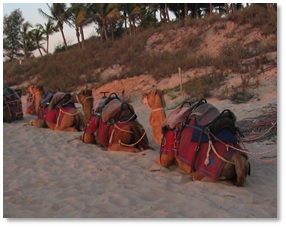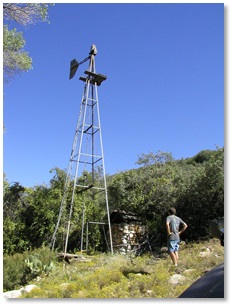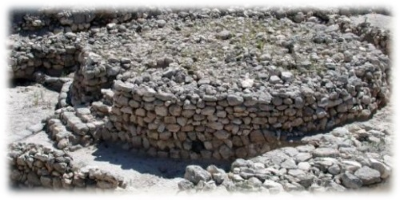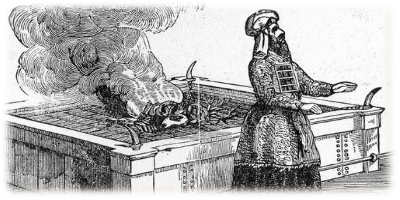Once we have a basic understanding of the Hebrew alphabet, vocabulary, language and philosophy, we can now begin to interpret the Bible from an Ancient Hebrew perspective rather than from a Western one.
Most people are familiar with the English translation of the Aaronic blessing.
The LORD bless you and keep you: The LORD make his face to shine upon you, and be gracious to you: The LORD lift up his countenance upon you, and give you peace. (Numbers 6:24-26 RSV)
Notice that many of the words in this translation are abstract words, including; bless, keep, gracious, countenance and peace. Each of the Hebrew words behind the English in this passage, is filled with images that are lost when translated into the English language. When we examine each of these words from their original cultural and linguistic perspectives, the message in this passage comes alive.
Bless

Camels kneeling down
The Hebrew verb ברך (Barakh, Strong's #1288) means to kneel as seen in Genesis 24:11. However, when written in the piel form, such as it is in Aaronic blessing, it means to show respect (usually translated as bless). However, as "respect" is an abstract word, we need to uncover its original concrete meaning, which we can do by examining other words related to this verb. One such related word is the noun ברך (berekh, Strong's #1288) meaning "knee." Another related Hebrew word is ברכה (berakhah, Strong's #1293) meaning a gift or present. From this we can see the concrete meaning behind the piel form of the verb barak. It is to bring a gift to another while kneeling out of respect. The extended meaning of this word is to do or give something of value to another. Elohiym "respects" us by providing for our needs and we in turn "respect" Elohiym by giving him of ourselves as his servants.
Keep

Thorns
The Hebrews were a nomadic people raising livestock. It would not be uncommon for a shepherd to be out with his flock, away from the camp, over the night. In order to protect the flock, the shepherd would construct a corral of thorn bushes. The shepherd would then guard over the flock and the corral would be a hedge of protection around them. The Hebrew word for a thorn is שמיר (shamiyr, Strong's #8068) and derived from the verb שמר (shamar, Strong's #8104), which literally means to guard and protect and is the word used in the Aaronic blessing.
Face

Norman Rockwell's painting of a girl's expression
In the painting above you can "read" the faces of each of the people within the painting. The face reflects the many different moods, emotions, and thoughts of the person. The Hebrew word פנים (paniym, Strong's #6440), means "face," but is always written in the plural form (the ים suffix identifies this word as plural), reflecting this idea of multiple faces of each person. This word can also mean “presence” or the “wholeness of being” of an individual.

Shine

Light brings order to chaos
The word אור (or, Strong's #215), as a noun means "light" and as a verb, as it is used here, means to "give light" or "shine" and is equated with bringing about order as light illuminates or reveals what has been dark.
Gracious

A nomadic camp
Most theologians will define “grace” as “unmerited favor,” but notice the abstractness of these words. The Hebrew verb translated as gracious in the Aaronic blessing is the verb חנן (hhanan, Strong's #2603) and is often paralleled with other Hebrew words meaning healing, help, being lifted up, finding refuge, strength and rescue. From a concrete Hebraic perspective this verb means to “provide protection.” Where does one run to for protection? The camp, which in Hebrew is חנה (hanah, Strong's #2583), a word related to חנן (hhanan).
Grant

A meal that is set and arranged
The Hebrew verb שים (siym, Strong's #7760), literally means to "set down in a fixed and arranged place."
Peace

A windmill that is "not complete."
When we hear the word peace, we usually associate this to mean an absence of war or strife. However, the Hebrew word שלום (shalom, Strong's #7965) has a very different meaning. The root of this word is שלם (shalam, Strong's #7999) and is usually used in the context of making restitution. When a person has caused another to become deficient in some way, such as a loss of livestock, it is the responsibility of the person who created the deficiency to restore what has been taken, lost or stolen. The verb shalam literally means to make whole or complete. The noun shalom has the more literal meaning of being in a state of wholeness, or being without deficiency.
A Hebraic interpretation of the Aaronic Blessing
With the Hebraic understanding of each of these Hebrew words, we can better understand the true meaning of the Aaronic blessing as it was understood by the Ancient Hebrews.
YHWH will kneel before you[1] presenting gifts and will guard you with a hedge of protection.
YHWH will illuminate the wholeness of his being toward you bringing order and he will give you comfort and sustenance.
YHWH will lift up his wholeness of being and look upon you and he will set in place all you need to be whole and complete.
1. Many people have contacted me concerned about the phrase "kneel before you" as they cannot perceive of God kneeling before us. We too often see God as the judge and ruler who sits high above us. But I see more of a familial type relationship with God, rather than a government type relationship. God is the father of us all, agreed? Well, if my young son came to me with a request, would I tower over him looking down upon him? Or would I get down on his level by "kneeling" down and getting eye to eye with him and say, "What is it my son, what can I do for you?" Let me add that this is not a literal kneeling down, but a figurative one; the common Hebrew way of expressing an abstract thought through concrete means.

Like what you’re discovering? Continue the journey from Bible reader to translator.
|






